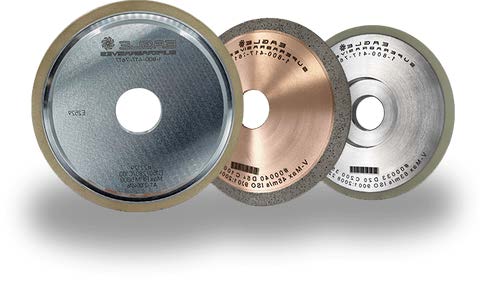Pros and Cons of a CBN Grinding Wheel
Pros:
- Thermal Stability: CBN’s superior thermal conductivity and stability allow it to maintain its effectiveness at high temperatures, making it ideal for grinding steel.
- Longevity: The hardness and wear resistance of CBN result in a longer lifespan compared to other abrasive materials.
- Precision: CBN wheels offer a high degree of precision, crucial for applications requiring tight tolerances.
- Versatility: Suitable for both wet and dry grinding, CBN wheels can be used in a variety of machining operations.
Cons:
- Cost: CBN grinding wheels typically have a higher initial cost than conventional abrasives.
- Limited Application: While excellent for hard materials, CBN may not be the best choice for softer materials, where conventional abrasives might suffice.
The Difference Between CBN and Diamond
The primary difference between CBN and diamond lies in their chemical composition and thermal properties. Diamond is composed of carbon, whereas CBN is made up of boron and nitrogen. This difference gives CBN a higher thermal stability, making it more suitable for machining ferrous materials like steel. Diamond, while harder than CBN, suffers from a carbon-iron reaction at high temperatures, limiting its effectiveness on steel.
Is CBN Better than Diamond for Grinding Steel?
In the context of grinding steel and other ferrous materials, CBN is indeed the better choice. Its ability to withstand high temperatures without undergoing a chemical reaction with steel, combined with its hardness and durability, make it more effective and longer-lasting than diamond in steel machining applications.
Additional Considerations in Using CBN Wheels
- Coolant Use: While CBN can be used for both dry and wet grinding, the use of a coolant can enhance its performance, especially in high-speed applications, by reducing heat and extending wheel life.
- Fine Grit Options: For achieving high-quality finishes on steel, fine-grit CBN wheels can be used, offering a balance between material removal rates and surface finish quality.
- Resin and Vitrified Bonds: The choice between resin and vitrified bonds in CBN wheels depends on the specific application. Vitrified bonds offer rigidity and precision, while resin bonds provide more flexibility.
- Grinding Pressure and Speed: Optimizing grinding pressure and speed can enhance the performance of CBN wheels, ensuring efficient material removal while maintaining the integrity of the workpiece.
- Wheel Life and Maintenance: Regular truing and dressing of CBN wheels can extend their life and maintain grinding accuracy.
![]()
CBN grinding wheels represent a significant advancement in the machining of steel and other hard materials. Their thermal stability, hardness, and resistance to wear make them superior to diamond wheels for steel applications. By understanding the properties of CBN and the factors that affect its performance, manufacturers can optimize their grinding processes, achieving high-quality results with greater efficiency and precision. As machining technologies continue to advance, the role of CBN in industrial applications is set to grow, further solidifying its status as a critical tool in modern manufacturing.



 Why is CBN Better for Machining Steel than Diamond?
Why is CBN Better for Machining Steel than Diamond?
